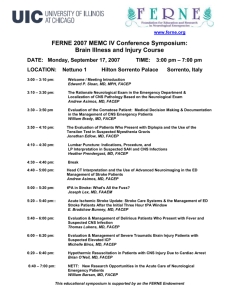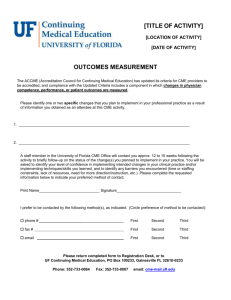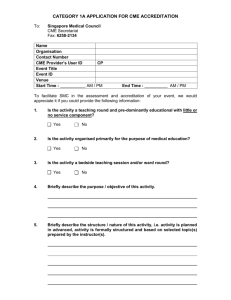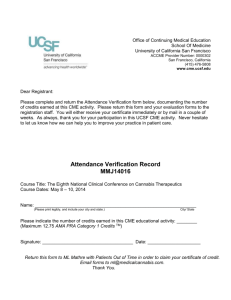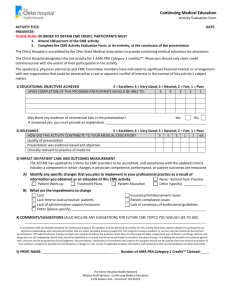ferne_cme_2007_HTN_a.. - Foundation for Education and
advertisement
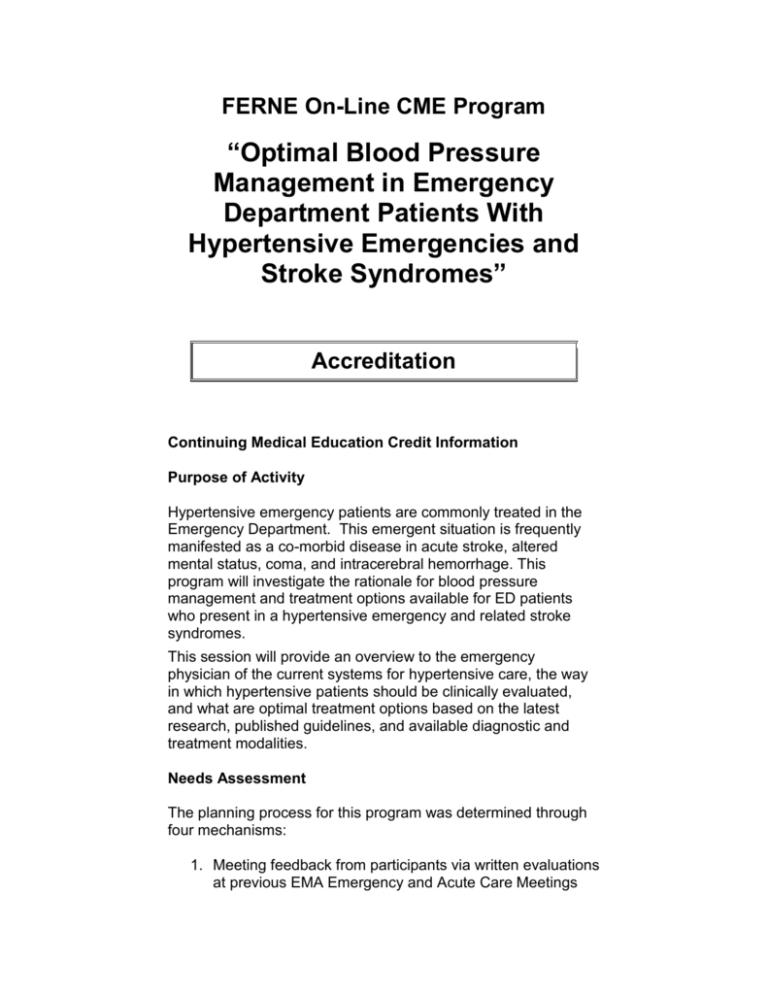
FERNE On-Line CME Program “Optimal Blood Pressure Management in Emergency Department Patients With Hypertensive Emergencies and Stroke Syndromes” Accreditation Continuing Medical Education Credit Information Purpose of Activity Hypertensive emergency patients are commonly treated in the Emergency Department. This emergent situation is frequently manifested as a co-morbid disease in acute stroke, altered mental status, coma, and intracerebral hemorrhage. This program will investigate the rationale for blood pressure management and treatment options available for ED patients who present in a hypertensive emergency and related stroke syndromes. This session will provide an overview to the emergency physician of the current systems for hypertensive care, the way in which hypertensive patients should be clinically evaluated, and what are optimal treatment options based on the latest research, published guidelines, and available diagnostic and treatment modalities. Needs Assessment The planning process for this program was determined through four mechanisms: 1. Meeting feedback from participants via written evaluations at previous EMA Emergency and Acute Care Meetings 2. Feedback from past FERNE meeting participants via a written survey form 3. FERNE Executive and Advisory Boards 4. FERNE special meetings with faculty and residents in Emergency Medicine Through these input vehicles, it has been determined that learning more about the optimal management of patients with neurological emergencies includes the need to understand how to optimally treat blood pressure in the setting of possible increased ICP and diminished CPP when hypertensive emergencies exist. Target Audience This educational activity has been developed for emergency physicians. Method of Participation This online educational program allows the learner three options for reviewing the content of this CME program, including: View the video lectures: The archived lectures includes the speaker’s PowerPoint slide set, video, and audio. You may listen and view the lecture and simultaneously review the slides. Listen to the lectures in MP3 format: The lecture recording is available for listening in MP3 format. The MP3 files are available for online listening or may be downloaded for remote listening. The MP3 files may also be played while simultaneously viewing the slides. Print and Read the PowerPoint Slides, Overview, and Key Clinical Questions: The PowerPoint slide sets, Overview, and Key Clinical Questions are available for online viewing which may be downloaded and printed for remote reading. All of these options will require up to two hours to complete. Completion of the CME assessment questions, evaluation, and CME request form are estimated to take approximately 15 minutes. To complete this educational activity as designed, the participant should do the following: read the learning objectives (below); choose one or more of the three venues and review the content; and complete the CME assessment questions, an Evaluation Form, and a CME Request Form. There is no fee for this program. The participant must answer the CME assessment questions with 75% accuracy, complete an evaluation form and a CME request form all of which should either be submitted electronically through the FERNE website at www.ferne.org or be faxed back to the FERNE office to receive a CME certificate. Release date: November 1, 2007 Expiration date: October 31, 2008 Learning Objectives Upon completion of this program, the participant should be able to: Determine the definition of hypertensive emergencies, and discuss their epidemiology and pathophysiology in ED patients with stroke syndromes. Identify what therapies are available for the treatment of ED patients with hypertensive emergencies and stroke syndromes. Discuss the clinically relevant endpoints for the evaluation and management of ED patients with hypertensive emergencies. Understand what guidelines and recommendations assist emergency care providers in optimally treating ED patients with hypertensive emergencies and stroke syndromes. Faculty Contributors Edward P. Sloan, MD, MPH, FACEP Moderator, Lecturer Professor, Department of Emergency Medicine University of Illinois College of Medicine, Chicago, IL. William B. Felegi, DO, FACEP Lecturer, Panelist Robert A. Giles, MD, FACEP Lecturer, Panelist William Dalsey, MD, FACEP Panelist Janet McGeehan, RN Panelist Richard Shih, MD, FACEP Panelist Brian Walsh, MD, FACEP Panelist Michael Gerardi, MD, FACEP Contributor Production Staff FERNE administrative and technology staff. Contributor Disclosures In accordance with ACCME Standards and UIC policy, contributors must disclose to the program audience the existence of significant financial interests in or relationships with manufacturers of commercial products that might have a direct interest in the subject matter, as well as relationships with the commercial supporter of this CME activity. These contributors do not consider that such relationships will influence their contributions. Disclosure information provided by the contributors is as follows: There are no disclosures to announce. Acknowledgment of Commercial Support This educational activity is supported by an unrestricted educational grant from The Medicines Company. Accreditation Statement ” Optimal Blood Pressure Management in Emergency Department Patients With Hypertensive Emergencies and Stroke Syndromes” has been planned and implemented in accordance with the Essentials Areas and policies of the Accreditation Council for Continuing Medical Education (ACCME) through the joint sponsorship of the University of Illinois College of Medicine and FERNE. The University of Illinois College of Medicine is accredited by the ACCME to provide continuing medical education for physicians. The University of Illinois at Chicago (UIC) College of Medicine designates this education activity for a maximum of 2.0 AMA PRA Category 1 credit(s)TM. Physicians should claim only those credits commensurate with the extent of their participation in the activity. Publisher's Notice FERNE is pleased to make this CME activity available as a benefit to its constituency. Although the cost of creating this program has been underwritten by an educational grant from a commercial entity, FERNE and the presenters of this information had sole control of the content. Federal regulations, FERNE, UIC and ACCME policies prohibit commercial underwriters from directing or otherwise controlling the content of CME activities FERNE provides. Every effort has been made to ensure that the information presented is evidence based, fair, objective, and scientifically rigorous. This information is provided for the sole purpose of continuing medical education. Readers are advised to use their reasoned best judgment as to whether this information should result in a change in their patient care practices, and to note that FERNE does not endorse the use of any particular therapeutic agent or approach to treatment unless otherwise recommended in an ACEP Clinical Policy. FERNE makes every effort to ensure that contributors to FERNE-sponsored programs are knowledgeable authorities in their fields. Participants are, nevertheless, advised that the statements and opinions expressed in this program are provided as guidelines and should not be construed as FERNE policy. The material contained herein is not intended to establish policy, procedure, or a standard of care. The views expressed in this educational activity are those of the contributors and not necessarily the opinion or recommendations of FERNE and The Medicines Company. FERNE and The Medicines Company disclaim any liability or responsibility for the consequences of any actions taken in reliance on those statements or opinions. Please send correspondence to ferne@ferne.org. Please be sure to review the presentations before you take this test and answer the evaluation questions. By completing this test and receiving your CME certificate, you are attesting that you have completed the entire program as described in "Method of Participation" on the CME page. This educational symposia is supported by an unrestricted educational grant from The Medicines Company Copyright © FERNE 2007
